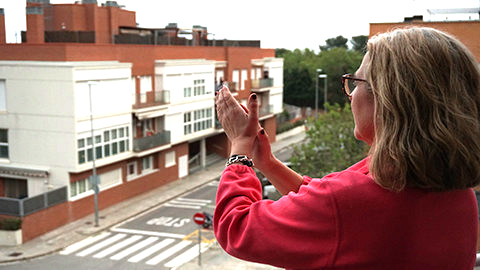Women and young most affected by confinement
Researchers have published the first results from the Observatory for Confinement, created by the Stress and Health Research Group at the UAB Faculty of Psychology and the ARA newspaper, an initiative aimed at evaluating the population's adaptation to the current situation. These first results form part of the survey designed by researchers Joaquim T. Limonero and Jordi Fernández-Castro, which received 16,000 responses from 1 to 5 April.

According to the survey, women feel more uncertain, are les optimistic, more nervous, angry or sad, and feel less capable of managing the situation, and also sleep worsel. In contrast, they are the ones to maintain their routines and to give and receive support.
The Stress and Health Research Group at the UAB Faculty of Psychology, with support of the ARA newspaper, has created the Observatory for Confinement, an initiative to evaluate the population's adaptation to the current situation. The first results obtained by the observatory are taken from a survey designed by researchers Joaquim T. Limonero and Jordi Fernández-Castro. The survey received over 16,000 responses from 1 to 5 April, during the third week of confinement, and coincided with stronger restrictions in movement.
Routines are Key for Optimism
Specialists in stress and health at the UAB point out that attitudes towards the future are connected to practical attitudes taken on during confinement: there is a correlation beetween optimism and sleeping well, maintaining a routine and giving and receiving support.
The large majority of participants, 69.9%, feel great uncertainty on how the pandemic will evolve, with 5 points or more on a scale from 1 to 7, and only 45.3% are very optimistic about the future after the pandemic. With regard to the current situation, only 27.5% fell very nervous, angry or sad, while 86% feel capable of managing the confinement. A total of 76.1% sleep well, while 86.4% maintain their routines and 90.4% give and receive support from their friends and family.
Gender Roles Continue to Be Present
Researchers highlight that differences between men and women are small, but statistically relevant. They all point in the same direction and are linked to sociocultural influences. Women feel more uncertain, have more anxiety, are angry or sad, fell less capable of managing the situation and sleep poorly. However, they are the ones who most maintaing their routines and who give and receive more support.
Controversial Situations Amongst the Youngest
In data per age, different patterns can be seen. With regard to the future, the youngest and oldest participants feel less uncertainty and more optimism, while the middle-aged fell more uncertainty and less optimism. Possibly because they are the population most directly affected by the pandemic. Paradoxically, the current situation provokes more anxiety, anger and sadness amongst the youngest population, who also feel less prepared to manage the situation, sleep worse, keep up less routines and give and receive less support. These results improve the older the participant is.
Education Levels are Irrelevant
With regard to educational level, there are only a few aspects in which the differences are significant. As with age, two patterns can also be observed. On the one hand, people with less education are more nervous, angry or sad and feel less able to manage the situation.
On the other hand, when maintaining routines, those who have primary and university studies score higher, while those in-between find it more difficult to cope.
The ARA newspaper has worked with members of the Stress and Health Research Group (Grup de Investigació en Estrés i Salut, GIES) studying the psychological factors affecting the state of biopsychosocial health. They have published the graphs resulting from the research and which allow to view the data interactively.